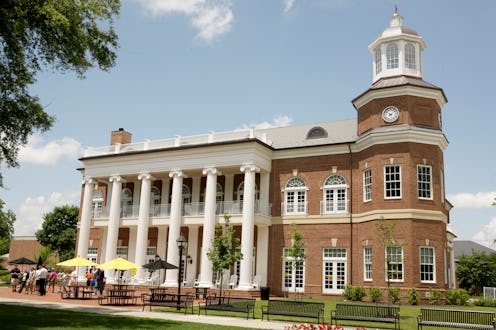Someone had to break the news: Money definitely doesn't grow on trees for liberal arts graduates. According to The Wall Street Journal, students who attended the top 50 (as determined by SAT scores) liberal arts colleges make substantially less on average than those who attended the top 50 research universities. The median earning for students who graduated about a decade ago from top research universities was $20,000 greater than that of students who attended liberal arts colleges. This study isn't the only one giving liberal arts schools an unnecessarily bad rep.
The liberal arts possess an aura of academic nostalgia, but students who recently entered college are not amused, based on a 2014 mass survey of US college freshmen conducted by UCLA. The results show that 77 percent of freshmen at Baccalaureate institutions (a category that encompasses four-year colleges as well as research universities) categorized training for a particular career as a very important reason for attending college. The study suggests that only about 46 percent of freshmen felt the same way about becoming a more cultured human being.
These studies coincide with a decline in enrollment at liberal arts colleges. In 2012, the Association of American Colleges and Universities conducted a study which found that 82 out of 212 colleges have stopped identifying as a liberal arts school since 1990. The study adds that they have begun incorporating characteristics of professional schools to attract larger student bodies.
The future for liberal arts colleges may seem bleak, but there's no need for wannabe students to dismay. The recent data ignores some important perspectives. Satisfaction and money don't go hand in hand. Similarly, the correlation between liberal arts and income doesn't equal causation. Despite the scares prompted by The Wall Street Journal's findings, liberal arts students aren't doomed to be poorer than their counterparts. And as most of these students know, it's not all about the money anyway.
1) A Liberal Arts Education Is Malleable
Looking back at your career goals as an 18-year-old entering college might feel shocking. According to the U.S. Census Bureau, only 27.3 percent of graduates pursue careers that match their majors. For example, consider liberal arts graduates who work in the tech industry on marketing, sales, writing, and coaching. Forbes reports that Slack Technologies, a notable tech startup, is estimated to be worth over $300 million. And it may come as a surprise that its CEO and co-founder is no software engineer; Stewart Butterfield has a degree in philosophy.
Unlike math and science, the subject rarely offers a "right" answer, but maybe that's what encouraged Butterfield to think outside of the box. And that's just the point — a liberal arts education allows graduates to be creative with their careers.
2) Overall Satisfaction Is Not Correlated With Earnings
According to a study published by Mic, three-quarters of recent art school graduates identified as either highly or somewhat satisfied. It also suggests that of those recent grads, only 14 percent break $30,000 yearly. And to top it off, a study conducted by the Center for Civil Society Studies at Johns Hopkins University shows that with 10.7 million jobs, the nonprofit sector — which gives money away for better causes — makes up almost a third of the retail and manufacturing workforce. People entering these fields already know what they're in for, and they don't let it stop them.
3) College, Regardless Of Major, Is Rarely A Regret
Whether graduates feel monetarily fulfilled, personally fulfilled, or both, they rarely regret attending college. A study published by the Pew Research Center in 2014 suggests that 62 percent of millennials who graduated college believe their education has paid off. Of the remaining 38 percent, 26 percent aren't discouraged by the lack of instant gratification, and have hope that their education will pay off in the future. The Annapolis Group, a consortium of 130 independent liberal arts schools, conducted a similar survey of alumni. In retrospect, 77 percent of them rated their experience as excellent.
